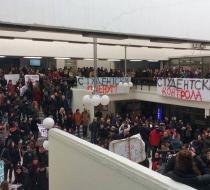Autonomous Zones Favorite
After winning the parliamentary elections of 2014 Gruevski was accused by the opposition of rigging the elections, which led the latter to boycott the sessions of the legislative. Mass protests followed with the government – though nominally pro-EU and pro-NATO – making innuendo about ‘foreign influence’ prompting similar concerns from Russia. In June 2015 the EU stepped in to broker a power-sharing deal that stipulated early elections to be held in April 2016. While the protests were the largest the country had seen since independence and the conflict got a falvor of East-West geopolitical confrontation that has appeared elsewhere in the region, the initial mobilization that prepared the ground for the escalation and the EU stepping in were in fact precipitated by domestic issues and the actions of students. It is therefore worth revisiting the Macedonian student protests of 2014-2015 to demonstrate how what can be described as an unruly generational factor forced the hand of the government, the opposition, and the international players in the crisis.
On 11 February over a thousand students started to occupy four faculties of the university in Skopje. They proclaimed them ‘autonomous zones’ and held alternative lectures, concerts, and other events. The occupation strike would last for 15 days. In reaction, the government made a U-turn: it opened negotiations with students and professors and after a few days decided to repeal the adopted law and instead commit itself to drafting a completely new higher education law without the provision for the state exams that had sparked the student protests.







